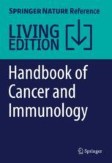Search
Search Results
-
Non-canonical antigens are the largest fraction of peptides presented by MHC class I in mismatch repair deficient murine colorectal cancer
BackgroundImmunotherapy based on checkpoint inhibitors is highly effective in mismatch repair deficient (MMRd) colorectal cancer (CRC). These tumors...

-
Non-canonical transcriptional regulation of the poor prognostic factor UGT2B17 in chronic lymphocytic leukemic and normal B cells
BackgroundHigh expression of the glycosyltransferase UGT2B17 represents an independent adverse prognostic marker in chronic lymphocytic leukemia...

-
OTUB1 accelerates hepatocellular carcinoma by stabilizing RACK1 via its non-canonical ubiquitination
BackgroundDysregulated ubiquitination modification occupies a pivotal role in hepatocellular carcinoma (HCC) tumorigenesis and progression. The...

-
Cancer Antigens: Sources, Generation, and Presentation
Immune surveillance by T cells requires antigen presentation by molecules encoded by MHC (major histocompatibility complex) class I and class II...
-
Thinking outside the box: non-canonical targets in multiple sclerosis
Multiple sclerosis (MS) is an immune-mediated disease of the central nervous system that causes demyelination, axonal degeneration and astrogliosis,...

-
LINE1 are spliced in non-canonical transcript variants to regulate T cell quiescence and exhaustion
How gene expression is controlled to preserve human T cell quiescence is poorly understood. Here we show that non-canonical splicing variants...

-
Long-term retention of antigens in germinal centers is controlled by the spatial organization of the follicular dendritic cell network
Germinal centers (GCs) require sustained availability of antigens to promote antibody affinity maturation against pathogens and vaccines. A key...

-
Dual targeting of cancer metabolome and stress antigens affects transcriptomic heterogeneity and efficacy of engineered T cells
Few cancers can be targeted efficiently by engineered T cell strategies. Here, we show that γδ T cell antigen receptor (γδ TCR)-mediated cancer...

-
Peripheral blood non-canonical small non-coding RNAs as novel biomarkers in lung cancer
One unmet challenge in lung cancer diagnosis is to accurately differentiate lung cancer from other lung diseases with similar clinical symptoms and...

-
Progression of monoclonal gammopathy of undetermined significance to multiple myeloma is associated with enhanced translational quality control and overall loss of surface antigens
BackgroundDespite significant advancements in treatment strategies, multiple myeloma remains incurable. Additionally, there is a distinct lack of...

-

-
Synthetically glycosylated antigens for the antigen-specific suppression of established immune responses
Inducing antigen-specific tolerance during an established immune response typically requires non-specific immunosuppressive signalling molecules....

-
Low-Field Magnetic Stimulation Accelerates the Differentiation of Oligodendrocyte Precursor Cells via Non-canonical TGF-β Signaling Pathways
Demyelination and oligodendrocyte loss are characteristic changes in demyelinating disorders. Low-field magnetic stimulation (LFMS) is a novel...

-
The small tumor antigen of Merkel cell polyomavirus accomplishes cellular transformation by uniquely localizing to the nucleus despite the absence of a known nuclear localization signal
BackgroundMerkel Cell Carcinoma (MCC) is an aggressive skin cancer that is three times deadlier than melanoma. In 2008, it was found that 80% of MCC...

-
In-vivo expressed Mycobacterium tuberculosis antigens recognised in three mouse strains after infection and BCG vaccination
Novel tuberculosis (TB)-vaccines preferably should (i) boost host immune responses induced by previous BCG vaccination and (ii) be directed against Myc...

-
Non-mutational neoantigens in disease
The ability of mammals to mount adaptive immune responses culminating with the establishment of immunological memory is predicated on the ability of...

-
Immune landscape in Burkitt lymphoma reveals M2-macrophage polarization and correlation between PD-L1 expression and non-canonical EBV latency program
BackgroundThe Tumor Microenviroment (TME) is a complex milieu that is increasingly recognized as a key factor in multiple stages of disease...

-
Fibroblasts as a source of self-antigens for central immune tolerance
Fibroblasts are one of the most common but also neglected types of stromal cells, the heterogeneity of which underlies the specific function of...

-
MR1 antigen presentation to MAIT cells and other MR1-restricted T cells
MHC antigen presentation plays a fundamental role in adaptive and semi-invariant T cell immunity. Distinct MHC molecules bind antigens that differ in...

-
Second messenger 2'3'-cyclic GMP-AMP (2'3'-cGAMP): the cell autonomous and non-autonomous roles in cancer progression
Cytosolic double-stranded DNA (dsDNA) is frequently accumulated in cancer cells due to chromosomal instability or exogenous stimulation. Cyclic...

